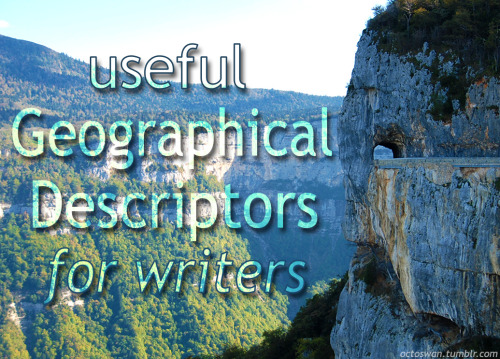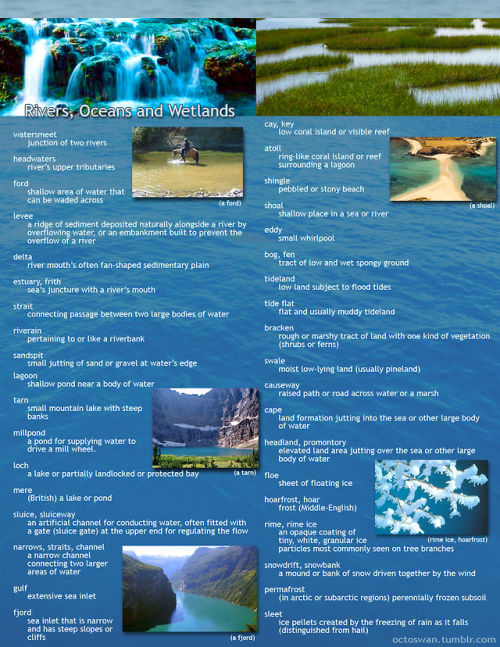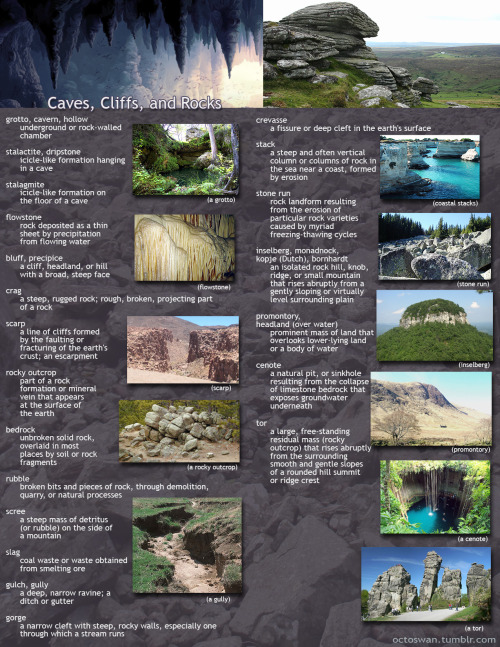It Is Well-known That If You Give Your Name Or Eat The Food Of A Fey, They Have Power Over You, And In
It is well-known that if you give your name or eat the food of a Fey, they have power over you, and in turn own you. You decided this wasn’t a terrible deal.
More Posts from Void-writes-stuff and Others
to the casual observer it may look like i'm trying to summon a demon but anyone who knows me will realize that i am simply calling my wife





I made these as a way to compile all the geographical vocabulary that I thought was useful and interesting for writers. Some descriptors share categories, and some are simplified, but for the most part everything is in its proper place. Not all the words are as useable as others, and some might take tricky wording to pull off, but I hope these prove useful to all you writers out there!
(save the images to zoom in on the pics)
One of my favorite D&D gags that I ever came up with is part of a oneshot I've run a few times where the party is hired by a young wizard to help clear out a few active security measures in a tower that the wizard inherited from her old teacher.
The first obstacle to be cleared is the re-animated skeletons that the old wizard was using for gardening help. It's a pretty straightforward fight, but during the encounter, players may notice one particular raised bed of herbs that is set back in a corner of the garden by itself.
Upon further investigation, this one raised bed is absolutely shining with magical protections. There are runes carved into the wood of the bed, gemstones inlaid in the top of it, this bed is absolutely protected out the ass... and an arcana check shows that the protections are all pointed inward, attempting to keep what's in there from getting out.
What's growing in that raised bed, you may ask? What is so dangerous that the old wizard felt the need to place all these protections?
Mint.
"He would not fucking say that" but it's "He would not handle someone having a breakdown in front of him like that."
Top-Tier Villain Motivations
They will be safe. It doesn't matter who else or what else burns as long as They will be safe.
I will be safe. The hunger and the cold will never touch me again.
Fuck any bitch who's prettier(/cooler/better-liked/better at making dumplings) than me.
Yes, Master
Love me. Love me. Love me. Love me. LOVE ME!
I know the terrible things these so-called "heroes" will do if I don't stop them (<- is absolutely wrong)
I don't want a better future, I want a better past!
No other way to get performance art funded these days
I think one of the biggest and most overlooked things to keep in mind when writing is: is how/what I am writing accomplishing what I am trying to accomplish?
Part of why so many writing "rules" don't work for everyone is that they're assuming you're trying to accomplish things that you're not trying to accomplish.
This way of thinking is applicable at every level and every step of your writing process.
Is this plot structure telling the story I want to be telling?
Does this scene evoke the emotion I am hoping to evoke?
Does this sentence mean what I intend it to mean, in a way that is likely to be read with that meaning by most readers?
If something in a story is jarring, for example, it's probably because that piece isn't accomplishing what you're otherwise trying to accomplish in the story.
When I talked about finding epithets jarring in a close third person POV, it's because what epithets do (provide distance from the character) inherently conflicts with what the point of view was intending (intimacy with the POV character).
If a scene or moment is jarring or just feels wrong in a book, it may be because it doesn't match the tone you are otherwise trying to cultivate, it breaks or escalates the tension in a way that you aren't intending, or it has a different narrative feeling than you are intending with the book.
Even down to the grammatical level, you can get away with breaking a lot of grammar rules if you can accomplish what you want to accomplish with the sentence. Is it coherent? Does it have the meaning you intend? Does it have the clarity or ambiguity that you are intending? Does it fit the tone that you are going for?
The same idea holds for the message/implication level. If you are implying or stating something in your story, is it what you mean to be implying or stating? If you are mimicking or subverting stereotypes, is it in a way that accomplishes what you are trying to accomplish?
One thing I’ve learned about writing is ”give everything a face”. It’s no good to write passively that the nobility fled the city or that the toxic marshes were poisoning the animals beyond any ability to function. Make a protagonist see how a desperate woman in torn silks climbs onto a carriage and speeds off, or a two-headed deer wanders right into the camp and into the fire. Don’t just have an ambiguous flock of all-controlling oligarchy, name one or two representatives of it, and illustrate just how vile and greedy they are as people.
it’s bad to have characters who serve no purpose in the story, but giving something a face is a perfectly valid purpose.
-
 void-writes-stuff reblogged this · 6 days ago
void-writes-stuff reblogged this · 6 days ago -
 taigirly liked this · 1 month ago
taigirly liked this · 1 month ago -
 cannibaldruid liked this · 2 months ago
cannibaldruid liked this · 2 months ago -
 lolatree334 liked this · 3 months ago
lolatree334 liked this · 3 months ago -
 lepidoptera-theurgy liked this · 4 months ago
lepidoptera-theurgy liked this · 4 months ago -
 lilac445 liked this · 4 months ago
lilac445 liked this · 4 months ago -
 thefoxgirl7 liked this · 5 months ago
thefoxgirl7 liked this · 5 months ago -
 itssosimpleitshard liked this · 7 months ago
itssosimpleitshard liked this · 7 months ago -
 submasfan liked this · 7 months ago
submasfan liked this · 7 months ago -
 nooneyouknow43 liked this · 7 months ago
nooneyouknow43 liked this · 7 months ago -
 antycapricorn liked this · 7 months ago
antycapricorn liked this · 7 months ago -
 consumerofflesh1 liked this · 7 months ago
consumerofflesh1 liked this · 7 months ago -
 doin-a-think-good liked this · 8 months ago
doin-a-think-good liked this · 8 months ago -
 julius-vi-britannia reblogged this · 8 months ago
julius-vi-britannia reblogged this · 8 months ago -
 temporal-garbage liked this · 8 months ago
temporal-garbage liked this · 8 months ago -
 freshhideoutmusic liked this · 9 months ago
freshhideoutmusic liked this · 9 months ago -
 lumps-42 liked this · 9 months ago
lumps-42 liked this · 9 months ago -
 arandom7 liked this · 9 months ago
arandom7 liked this · 9 months ago -
 arandom7 reblogged this · 9 months ago
arandom7 reblogged this · 9 months ago -
 j-a-rale reblogged this · 9 months ago
j-a-rale reblogged this · 9 months ago -
 scarabies-real reblogged this · 9 months ago
scarabies-real reblogged this · 9 months ago -
 barbequetittiesfan liked this · 9 months ago
barbequetittiesfan liked this · 9 months ago -
 skipcount1 reblogged this · 9 months ago
skipcount1 reblogged this · 9 months ago -
 skipcount1 liked this · 9 months ago
skipcount1 liked this · 9 months ago -
 ilexdiapason reblogged this · 9 months ago
ilexdiapason reblogged this · 9 months ago -
 scarabies-real reblogged this · 9 months ago
scarabies-real reblogged this · 9 months ago -
 spaceysoupy liked this · 9 months ago
spaceysoupy liked this · 9 months ago -
 pirefyrelight reblogged this · 9 months ago
pirefyrelight reblogged this · 9 months ago -
 thegayerestfrog liked this · 9 months ago
thegayerestfrog liked this · 9 months ago -
 confused-magpie liked this · 9 months ago
confused-magpie liked this · 9 months ago -
 puppeteersailor liked this · 10 months ago
puppeteersailor liked this · 10 months ago -
 theseekerofchoice reblogged this · 10 months ago
theseekerofchoice reblogged this · 10 months ago -
 theseekerofchoice liked this · 10 months ago
theseekerofchoice liked this · 10 months ago -
 iwantadivorcekaren liked this · 10 months ago
iwantadivorcekaren liked this · 10 months ago -
 childofredmarigolds liked this · 10 months ago
childofredmarigolds liked this · 10 months ago -
 sampaisleyriot reblogged this · 10 months ago
sampaisleyriot reblogged this · 10 months ago -
 samiloowho liked this · 10 months ago
samiloowho liked this · 10 months ago -
 the-darkest-luminosity liked this · 10 months ago
the-darkest-luminosity liked this · 10 months ago -
 laurenpiplupfluff2 liked this · 10 months ago
laurenpiplupfluff2 liked this · 10 months ago -
 kitsuneluvuh reblogged this · 10 months ago
kitsuneluvuh reblogged this · 10 months ago -
 kitsuneluvuh liked this · 10 months ago
kitsuneluvuh liked this · 10 months ago -
 thelazywitchphotographer liked this · 10 months ago
thelazywitchphotographer liked this · 10 months ago -
 musi-creatively reblogged this · 10 months ago
musi-creatively reblogged this · 10 months ago -
 pumpkinsomniac reblogged this · 10 months ago
pumpkinsomniac reblogged this · 10 months ago -
 pumpkinsomniac liked this · 10 months ago
pumpkinsomniac liked this · 10 months ago -
 lilywolfgray reblogged this · 10 months ago
lilywolfgray reblogged this · 10 months ago -
 lilywolfgray liked this · 10 months ago
lilywolfgray liked this · 10 months ago -
 cauli-flawa liked this · 10 months ago
cauli-flawa liked this · 10 months ago -
 cauli-flawa reblogged this · 10 months ago
cauli-flawa reblogged this · 10 months ago -
 joen-lenawley reblogged this · 11 months ago
joen-lenawley reblogged this · 11 months ago
78 posts